Scarce AstraZeneca Vaccines For Iran Lawmakers Leads To Criticism
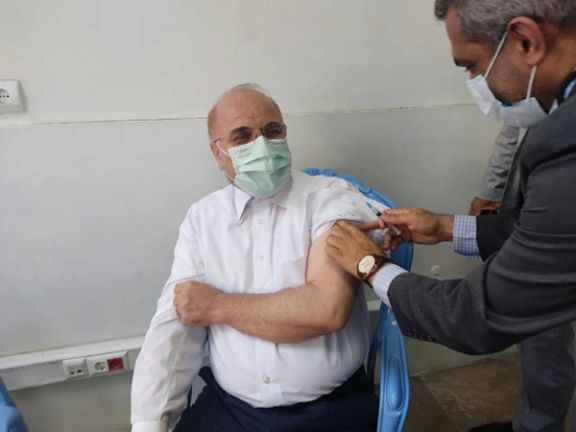
Members of the Iranian parliament have received AstraZeneca as their booster vaccine shot while the brand is not available for other people in the country.

Members of the Iranian parliament have received AstraZeneca as their booster vaccine shot while the brand is not available for other people in the country.
The report about providing AstraZeneca for the lawmakers on Wednesday sparked reactions by Iranians who were desperately looking for the vaccine.
Iran’s health ministry had confirmed the scarcity of AstraZeneca in Iran and urged people to trust the indigenous brands.
Iran’s Supreme Leader Ali Khamenei banned the purchase of American and British vaccines in January 2021, which set back Iran’s inoculation effort. Critics say that as a result tens of thousands unnecessarily died in the fifth wave of the pandemic last year.
Iran embarked on the development of homegrown vaccines, spending hundreds of million of dollars with little result. People do not trust what the government encourages them to accept as domestic vaccines.
Under public pressure, the government imported a limited quantity of Indian-produced AstraZeneca in 2021.
Recently the government announced it will stop importing vaccines as local variants would be sufficient for the country.
Enraged by the apparent discrimination in the distribution of vaccines, many people across Iran have decried the inoculation of lawmakers, asking why officials don’t use vaccines made in Iran.
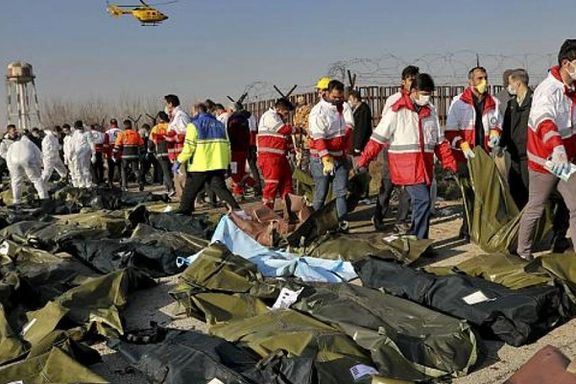
Canada, Britain, Sweden and Ukraine on Thursday said they had abandoned efforts to talk to Tehran about reparations for an airliner downed by Iran and would try to settle the matter according to international law.
Most of the 176 people killed when Iran shot down the Ukrainian jet in January 2020 were citizens from those four countries, which created a coordination group that seeks to hold Tehran to account.
"Despite our best efforts over the past two years and multiple attempts to resolve this matter through negotiations, the Coordination Group has determined that further attempts to negotiate with Iran ... are futile," it said in a statement.
"The Coordination Group will now focus on subsequent actions to take to resolve this matter in accordance with international law," it continued, but did not give details.
Tehran says Revolutionary Guards accidentally shot down the Boeing 737 jet and blamed a misaligned radar and an error by the air defense operator at a time when tensions were high between Tehran and the United States.
A court in Ontario, Canada, this week awarded C$107 million ($83.8 million), plus interest, to the families of six people who died.
Report by Reuters
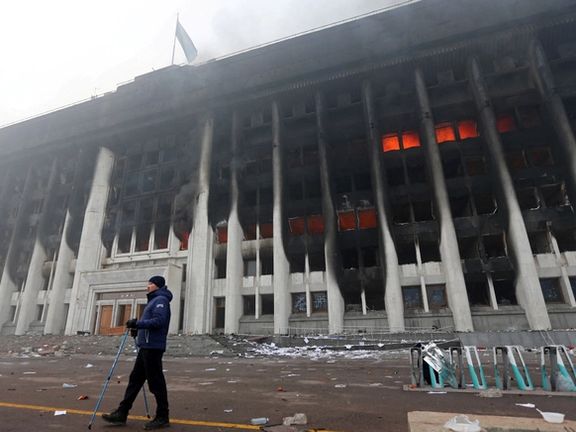
Iran has warned against meddling by foreign countries in Kazakhstan, the scene of violent protests, saying that the Tehran is monitoring the ongoing developments carefully.
Foreign Ministry Spokesman Saeed Khatibzadeh said on Thursday that Kazakhstan can resolve its issues at home peacefully and through dialogue and should not allow foreign meddling in the country.
He added that the stability and security of the “friendly and brotherly neighboring country” is very important for Tehran, noting that people of Kazakhstan should be wary of the attempts by foreign parties to exploit the unrest for their own interests.
Earlier on Thursday, Russia sent paratroopers into the country to quash the uprising following the deadly clashes that started after the government lifted a price cap on fuel.
A state of emergency has been declared in the country’s largest city Almaty, where police killed dozens of protesters who had set fire to a presidential residence and the mayor’s office in Almaty and stormed many other government offices.
According to state television, 13 members of the security forces have died, including two who were decapitated.
The unrest seems unprecedented for Kazakhstan that has been ruled since the Soviet era by its octogenarian leader Nursultan Nazarbayev, who has held its grasp over the country despite stepping down as president three years ago.
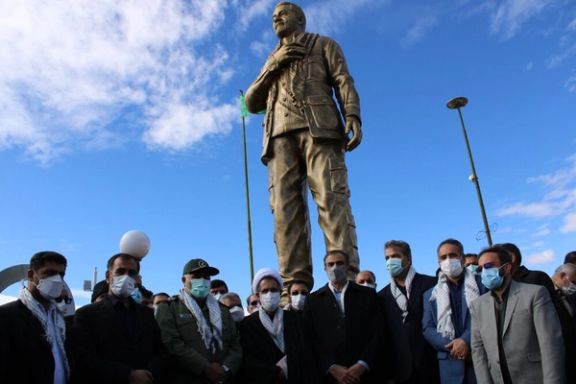
A memorial statue of Qasem Soleimani, the commander of Iran’s Revolutionary Guard Qods Force, was set on fire in the central city of Shahrekord on Wednesday.
A video which surfaced on social media Wednesday night showed the statue burning.
The monument had been erected in one of the main squares of the city in the morning, concurrent with the nationwide ceremonies to mark the second anniversary of his death.
Soleimani, who was Iran’s top military and intelligence operator in the Middle East, was killed by a targeted US drone strike on January 3, 2020, directly ordered by former US president Donald Trump.
The representative of Supreme leader Ali Kamenei in the city described the people behind the political vandalism as “idiots”.
In September 2021, police arrested a man for torching another statue of Soleimani in the southwestern city of Yasuj, not very far from Shahrekord.
A few months before that, three young men in the city of Baneh were sentenced to a total of 16 years and seven months in prison for setting fire to a banner of Soleimani.
Many Soleimani busts and figurines have been unveiled by hardliners and supporters of the IRGC since his killing in January 2020.
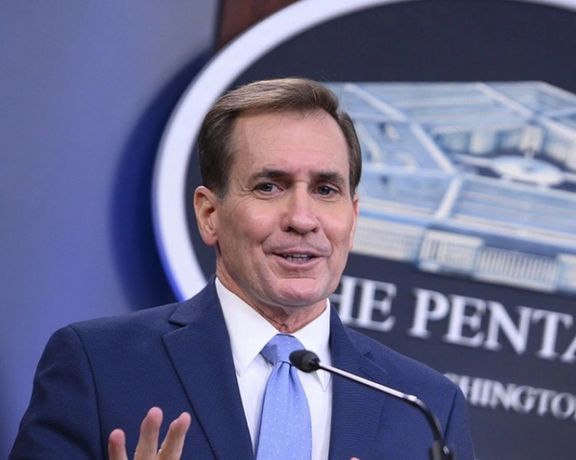
The United States says recent attacks on bases in Iraq and Syria that host American troops are typical of assaults by Iran-backed militia groups.
Pentagon Press Secretary John Kirby said in a briefing on Wednesday that Washington is mindful of the threat environment, and Iran knows how seriously we take the safety and security of our people and our mission in Iraq and Syria.
He admitted that the pace and frequency of such attacks have increased, noting that the reason can possibly be related to the anniversary of the strike that killed Qasem Soleimani and the change in the US mission in Iraq that officially transitioned to an advise and assist mission.
Iran-backed militia groups have said that change in the mission wasn't good enough, and that any presence beyond December 31st would be responded to… So, the result can be a confluence of all those things, Kirby said, stressing that no matter the reasons, the US was “preparing for the possibility of stepped-up attacks at the end of December.”
He added that the US military has increased its focus on the threat of rocket and drone attacks by Iran-back militia groups that “have become over time increasingly precise and increasingly lethal”.

A leading news website in Tehran says the current Majles is a "minority parliament" that should avoid provocative legislation opposed by most Iranians.
The ultra-conservative parliament has already annoyed a major part of the population by considering a bill to limit citizens access to the Internet and opposing a long-awaited pay adjustment for the country's low-paid teachers who have been taking to the streets in recent months, the moderate-conservative website, Khabar Online said.
The website added that insisting on ratifying radical laws will impose a high cost on the current Majles which has a weak voter base. Some lawmakers were elected by around 2 percent of their constituency's eligible voters.
Hundreds of reformist candidates were barred from candidacy in the 2020 election and ultra-conservatives virtually ran unopposed.
Based on a massive body of facts and figures, Khabar Online said that 38 of the lawmakers at the Majles have won between 2 to 10 percent of the votes in their constituencies. Two members won around 2 percent of the votes in their districts, while at least 3 lawmakers in this group chair various parliamentary committees despite their less than 10 percent voter base.
The next group includes 175 lawmakers who have won between 11 to 20 percent of the votes in their constituencies in the February 2020 parliamentary election. This is the largest group of lawmakers at the Majles, and Speaker Mohammad Bagher Ghalibaf who has won some 19 percent of the eligible votes in Tehran falls in this group.
The third group, which includes 77 lawmakers have won between 21 to 40 percent of the votes in their regions, while only two lawmakers managed to get 40 percent of eligible votes in their districts.
While the overall turnout of the 2020 election was announced as 42.5 percent, the actual turnout was far less due to the large number of void ballots. In some cities the number of votes won by the leading winner was less than the number of void ballots. According to Khabar Online, the reason for the low turnout, which was lowest in Tehran with just over 26 percent, was popular discontent over the bloody clampdown on the 2019 nationwide protests and barring reformist candidates from running in the election.
Last week, reformist newspaper Sharq examined the performance of the lawmakers and concluded that although the new Majles had promised to take on a predominantly supervisory role and control the presidential administration, it has done very little in this regard. According to one lawmaker who spoke on the condition of anonymity, the parliament’s performance was "unacceptable." The lawmaker criticized the ultraconservative parliament for "not being able to solve any of the country's economic problems, including its uncontrolled inflation."
Sharq quoted another lawmaker as having said that the Majles tables a large number of meaningless bills, "but some 95 percent of them are never being discussed, let alone being ratified." In August, the official news agency IRNA said that "over 300 bills were tabled by the lawmakers during the preceding 6 months often about insignificant matters."
At the same time, the Majles has failed to supervise President Ebrahim Raisi’s administration although more lawmakers have lately become vocal in their criticisms of the government.
According to Sharq, even Speaker Ghalibaf has called for less legislation, and demanded attaching more significance to the parliament's supervisory role. Nonetheless, last week, when lawmakers wanted to perform their supervisory role by impeaching the economy minister, it was Ghalibaf who stopped the motion.